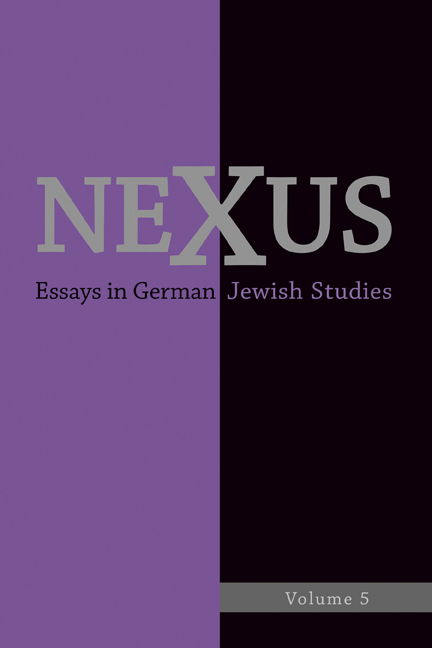 Nexus: Essays in German Jewish Studies, Volume 5
Nexus: Essays in German Jewish Studies, Volume 5 Book contents
- Frontmatter
- Dedication
- Contents
- Miscellaneous Frontmatter
- Introduction: Moments of Enlightenment for Jews and Other Germans
- Remembering Jonathan
- Jonathan M. Hess: Curriculum Vitae
- Maurice Sendak’s Dear Mili: A Contrapuntal Elegy
- Pluralism and the Modernized Jesus in Mendelssohn, Schiller, and Schleiermacher
- The Papal Game: Telling a Jewish Story from the Mayse bukh, Ayzik Meyer Dik and Marcus Lehmann
- The Fuzziness of Jewish and Non-Jewish Boundaries in Viennese Popular Culture around 1900: A Trend Toward “Similarity”?
- Freeing the Shtetl from the Ghetto Prism: Sholem Asch and Dovid Bergelson in German Translation
- A Poetics of Genocide: The Jewish Dead Confront the Germans in Katzenelson’s Warsaw Ghetto Poem “Vey dir”
- Appendix: “Vey dir”
- The New Ostjude and the Enlightened Ostdeutschen: Jewish Theater in the German Democratic Republic
- German Jewish lengevitch: A Plurilingual Poetics of Meddling
German Jewish lengevitch: A Plurilingual Poetics of Meddling
Published online by Cambridge University Press: 24 March 2021
- Frontmatter
- Dedication
- Contents
- Miscellaneous Frontmatter
- Introduction: Moments of Enlightenment for Jews and Other Germans
- Remembering Jonathan
- Jonathan M. Hess: Curriculum Vitae
- Maurice Sendak’s Dear Mili: A Contrapuntal Elegy
- Pluralism and the Modernized Jesus in Mendelssohn, Schiller, and Schleiermacher
- The Papal Game: Telling a Jewish Story from the Mayse bukh, Ayzik Meyer Dik and Marcus Lehmann
- The Fuzziness of Jewish and Non-Jewish Boundaries in Viennese Popular Culture around 1900: A Trend Toward “Similarity”?
- Freeing the Shtetl from the Ghetto Prism: Sholem Asch and Dovid Bergelson in German Translation
- A Poetics of Genocide: The Jewish Dead Confront the Germans in Katzenelson’s Warsaw Ghetto Poem “Vey dir”
- Appendix: “Vey dir”
- The New Ostjude and the Enlightened Ostdeutschen: Jewish Theater in the German Democratic Republic
- German Jewish lengevitch: A Plurilingual Poetics of Meddling
Summary
ULJANA WOLF BEGINS her multilingual experimental poetry work, meine schönste lengevitch, with an epigraph, translated into German, by the poet and philosopher Édouard Glissant: “Eine Spur in die Sprachen legen heißt, eine Spur ins Unvorhersehbare unserer nun gemeinsamen Lebensbedingungen zu legen” (To carve a trace into languages means to carve a trace into the unforseeable of our now shared conditions of living). Glissant, a Martinique-born Creole writer who spent his adult life in Paris, took as his motto to write “among all the languages of the world.” Yet despite its fundamental multiplicity, language for Glissant is always opaque, no longer capable of providing epistemological certainty; instead, it provides access to a world that could only ever be a “half-unknown.” And it is here that Wolf and Glissant provide us entry into the “halfunknown” of the poetic world of Paul Celan, in which the many neologisms that mark his work, in particular, enable us to slip into the opacity of that which is unpredictable (“das Unvorhersehbare”) evoked by Glissant. As Peter Middletown suggests in his article exploring poetic difficulty, it is this dwelling in the forever “half-unknown” of poetic difficulty that links Glissant and Paul Celan: “Glissant and Celan give us a sense … that poetic difficulty is not just due to verbal intricacy, hypertrophied allusiveness, or the poetic equivalents of quantum physics; poetic difficulty opens onto dark, historical depths.” Glissant's notion of translation as opening to “das Unvorhersehbare,” of enabling a tangle of multilingual or, rather, of postmonolingual textual encounters, helps explain why Wolf places his text as epigraph at the start to meine schönste lengevitch. Glissant's evocation of poetic space as “unvorhersehbar” is foundational for the multilingual work of Uljana Wolf and the work of the contemporary experimental poets explored in this essay, all of whom write intralingually, creating new poetic spaces that lie somewhere between English and German.
I begin with Wolf's evocation of Glissant as a way to explore the affective and poetic fibers that weave together a group of contemporary experimental poets who write in and between a number of languages, and for whom the figure of Paul Celan returns, again and again, sometimes as a spectral poetic presence, at other times as direct poetic interlocutor.
- Type
- Chapter
- Information
- Nexus: Essays in German Jewish Studies, Volume 5Moments of Enlightenment: In Memory of Jonathan M. Hess, pp. 195 - 212Publisher: Boydell & BrewerPrint publication year: 2021
